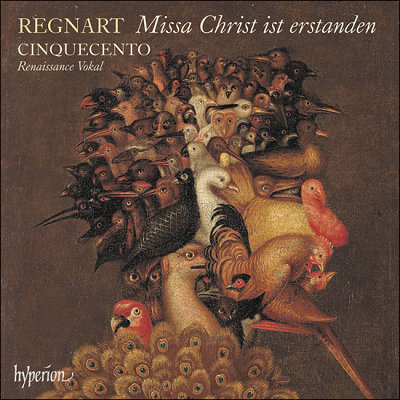Thanks to two recordings by the Vienna-based Cinquecento issued on Hyperion, the name of Jacob Regnart (c.1540-99) has become more familiar. On this showing the Flemish-born composer will continue to attract interest from performers and listeners alike. A near contemporary of Orlando di Lassus, Regnart worked during the second half of the 16th century at the court of the Hapsburgs in both Prague and Vienna. So popular were his collections of German part-songs that they were often reissued and attracted the attention of rival publishers keen to take advantage of Regnart’s growing reputation.
While this was based largely on his secular music, his liturgical works formed the greater part of his oeuvre and include some two dozen masses that were published after his death. The two masses recorded here, both for five voices and each based on a German Easter hymn tune, continue Cinquecento’s examination of the rich repertoire prompted by the Habsburg court. A wealth of flowing counterpoint characterises these works, but just before Regnart’s strict imitation becomes routine, he startles with an unexpected gesture, a striking closing cadence or a passage of sublime polyphony.

The Missa Christ ist erstanden provides several eyebrow-raising moments to make you question why this composer had been neglected until recent years. A spicy false relation pricks the ear near the start and end of each Kyrie, both enfolding a rapt ‘Christe’. Transparent textures outline expressions of adoration (‘Laudamus te’, Benedicimus te’) in the ‘Gloria’, and a buoyant ‘Cum Sancto Spirito’ precedes a shapely ‘Amen’, its melismas crowned by a magical final cadence with echoes of Lassus. Within the overlapping phrases of the ‘Credo’, the mystery of the Holy Spirit is beautifully achieved, its repose coming as relief from the dense counterpoint that dominates much of this text-laden movement. The coming of the Lord underpinning the ‘Benedictus’ is superbly captured in steadily rising pitches where Regnart shapes the melodic curve with great control. Arguably, he is at his most serene in the floating lines of the ‘Agnus Dei’, a pair of movements that both atone for and release us from the sins of the world.
The other setting of the Mass, Missa Freu dich, du werthe Christenheit, inhabits a similar landscape, but one seemingly more leisurely and echoing the longer phrases of its source. Its three-part ‘Kyrie’ (described in the booklet as ‘prayerful’) unfolds in a relaxed manner, now less congested in its polyphony. Passages in the ‘Gloria’ appear almost frisky such as the bars surrounding the holy father at ‘Filius Patris’, and later at the swinging ‘Cum Sancto Spirito’, the Holy Spirit generating a rhythmic impetus that has a definite spring in its step. As before, a sense of stillness envelopes the holy spirit at ‘Et incarnatus’, while Christ’s glorification is splendidly evoked in a soaring alto line that returns for the closing ‘Amen’ and brings a lofty nobility to the Sanctus. Infectious rhythms lift the ‘Benedictus, while the spacious ‘Agnus Dei’, wreathed in a halo of melismas and intermittent false relations is surely this work’s crowning glory, one which demonstrates Regnart’s remarkable emotional and musical range.
Filling up the disc are the hymn tunes on which the Masses are based and three motets. Each of these impresses for their inventive response to words and imagery, most notably in Rühmbt alle Werck deß Herren where the rise and fall of voices mirrors the mountains and valleys of the text, itself newly adapted to music originally attached to an Italian love song. There’s the hymn-like Wann ich nur dich hab and with the Marian motet Maria fein, du klarer Schein Regnart returns to imitative techniques with a melody borrowed from the devotional Catholic tune Maria zart.
It almost goes without saying that the performances from the five voices of Cinquecento are exemplary: intonation, balance, dynamic shading and phrasing are all delivered with customary distinction. I’ve warmed to these accounts and whole-heartedly recommend them. Sound quality is superb too, and the disc comes with texts, translations and scholarly booklet notes. Not to be missed for lovers of Renaissance polyphony.
David Truslove
Cinquecento: Terry Wey (countertenor), Achim Schulz, Tore Tom Denys (tenors), Tim Scott Whiteley (baritone), Ulfried Staber (bass)
Christ ist erstanden (hymn tune), Missa Christ ist erstanden, Rühmbt alle Werck deß Herren, Wann ich nur dich hab, Maria fein, du klarer Schein, Freu dich, du werthe Christenheit (hymn tune), Missa Freu dich, du werthe Christenheit
Hyperion CDA68369 [64.45]